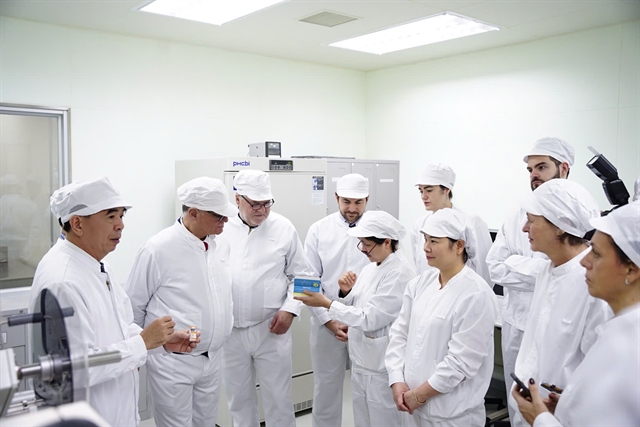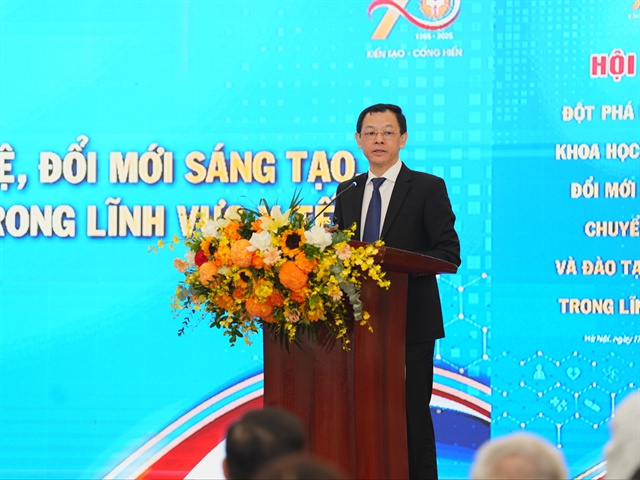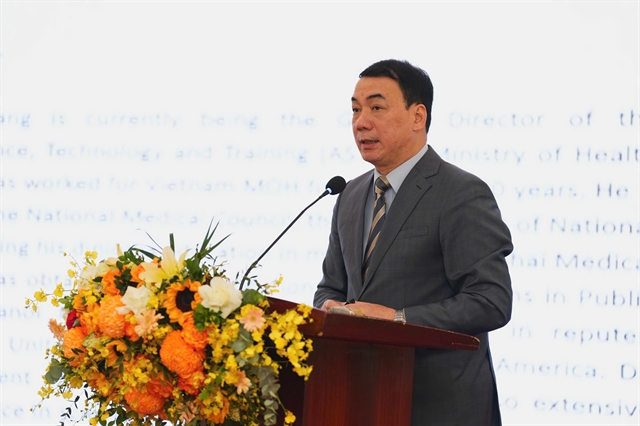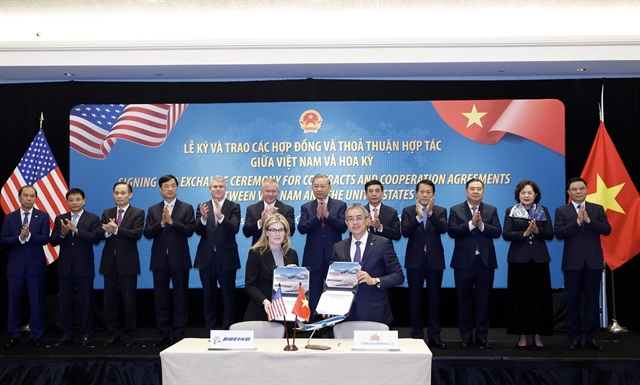 Society
Society

 |
| Việt Nam Nam is preparing to become one of only 10 low- and middle-income countries with the capacity to develop and manufacture life-saving mRNA vaccines that can be developed quickly to protect people from new diseases, according to the WHO in Việt Nam. POLYVAC (the Center for Research and Production of Vaccines and Biologicals) established by the Ministry of Health in 1994, already produces vaccines for measles, rubella, polio and rotavirus. Now, through its partnership with WHO and the United Nations' Medicines Patent Pool, POLYVAC is building the capacity to produce safe and effective mRNA vaccines locally by 2029. — Photo courtesy of the WHO in Việt Nam |
HÀ NỘI — The health sector has achieved significant progress in scientific and technological development, innovation, digital transformation and human resource training in recent years, Deputy Minister of Health Dr Nguyễn Tri Thức remarked.
Notably, there have been major breakthroughs in science and technology following the implementation of Resolution No. 57-NQ/TW dated December 22, 2024 of the Politburo on advancing national science and technology, innovation and digital transformation.
These efforts have generated new methods and products that enhance healthcare, disease prevention and public health improvement.
Thức underscored these points at a workshop on breakthroughs in science and technology development, innovation, digital transformation and human resource training in the health sector, held on Monday (November 17) in Hà Nội.
 |
| Deputy Minister of Health Dr Nguyễn Tri Thức addressed the workshop on breakthroughs in science and technology development, innovation, digital transformation and human resource training in the health sector, held on November 17 in Hà Nội. — Photo from the Ministry of Health |
Former Deputy Minister of Health Nguyễn Trường Sơn, along with leaders from various departments, institutes, universities and hospitals under or affiliated with the Ministry, representatives of non-public health facilities, and delegates from several ministries, sectors and health-related organisations attended the event.
According to Dr Nguyễn Ngô Quang, Director-General of the Department of Science, Technology and Training (under the health ministry), Resolution No. 57 serves as a call to action for domestic and international intellectuals and scientists engaged in research, new technology application and digital transformation. Its goal is to strengthen productive capacity, improve production relations, enhance labour productivity and national competitiveness, and create breakthroughs for the country's socio-economic development.
Dr Quang said strategic healthcare technology products focus on areas such as virtual assistants, specialised AI systems, analytical AI, large-scale data centres, traceability systems, next-generation vaccines, gene therapy and stem cell therapies.
Breakthrough projects in science, technology and innovation include:
• Collaboration on research and technology transfer for CAR-T immune cell therapy for cancer treatment; the National Children’s Hospital is currently finalising proposals and study protocols in cooperation with Germany and Singapore.
• Cooperation on research and technology transfer for producing mRNA-based lung cancer vaccines. Dr Quang noted this collaboration has a high feasibility, with Vietnamese partners now negotiating technology transfer agreements, aiming to manufacture vaccines domestically for export.
• Pilot application of mesenchymal stem cell therapy for cerebral palsy, autism and several chronic conditions. Nineteen clinical trials have been approved or are ongoing. Phase I trials of CAR-T immunotherapy for blood cancers have been completed, and preparation for Phase II is underway.
• Pilot research on personalised 3D-printed applications in injury treatment. Vinmec Hospital has completed assessment of the clinical trial protocol, approved it and is implementing the project in November 2025.
 |
| Dr Nguyễn Ngô Quang, Director-General of the Department of Science, Technology and Training (under the Ministry of Health), addressed the workshop on breakthroughs in science and technology development, innovation, digital transformation and human resource training in the health sector, held on November 17 in Hà Nội. — Photo from the Ministry of Health |
Dr Quang said the Ministry has built the framework for breakthrough scientific and technological missions for the 2025–2026 period.
In clinical medicine, five core missions have been identified: cell therapy (stem cells, immune cells), cell-based products for chronic and intractable diseases and healthcare, personalised medicine, gene therapy, and the development of new diagnostic, preventive and treatment techniques in Việt Nam, integrating traditional and modern medicine.
In pharmaceuticals and medicinal materials, nine core missions cover next-generation vaccine production, biologics, immunomodulatory drugs, development of medicinal materials and traditional medicine, new pharmaceutical production technologies, and dual-use health products serving defence, security and healthcare.
Regarding medical technology and equipment, priorities include advanced and specialised technologies, equipment and materials (3D printing, simulation, nuclear medicine, radiotherapy), robotics and automation, diagnostic reagents (IVD) and green medical technologies.
Digital technology efforts focus on applying AI in disease prevention, treatment and health management (geriatrics, cardiology, rare diseases, digital therapies, epidemic forecasting), developing a Vietnamese medical AI platform, using big data in several fields, and implementing traceability systems.
In the health policy sphere, priorities likewise include AI for disease prevention, treatment and management, a national health AI platform, big data applications and traceability systems.
“A total of 30 missions and projects on scientific and technological breakthroughs and innovation for 2025–2030 have been approved and are ready for implementation,” Dr Quang said.
At the workshop, participants also heard presentations by experts, managers and hospital leaders on science and technology development, innovation, digital transformation in health care, and training of health personnel. — VNS




